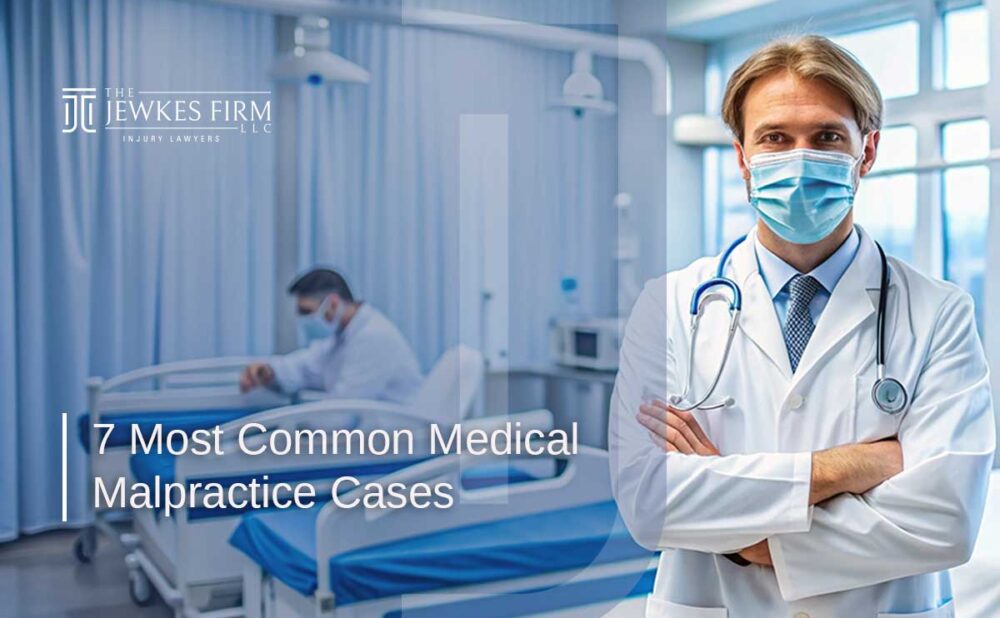7 Most Common Medical Malpractice Cases
Medical malpractice is a serious issue that affects thousands of patients across Georgia every year. When healthcare professionals fail to provide the standard of care expected, it can lead to devastating injuries, prolonged suffering, and even wrongful death. At The Jewkes Firm, we understand how overwhelming it can be to navigate the aftermath of medical negligence. That’s why we’re committed to helping victims of medical malpractice secure the compensation they deserve. In this article, Attorney Jordan Jewkes breaks down the most common types of medical malpractice cases in Georgia, so you can better understand your rights and when to seek legal help.
What Is Medical Malpractice?
Medical malpractice occurs when a healthcare provider—such as a doctor, nurse, surgeon, or hospital—deviates from the accepted standard of care, resulting in harm to the patient. This includes mistakes in diagnosis, treatment procedures, post-treatment care, or overall health management.
To prove medical malpractice in Georgia, the injured party must show:
- The healthcare provider had a responsibility to act professionally
- The provider breached that duty through negligence or omission
- The breach directly resulted in injury or harm
- The injury resulted in damages (medical bills, pain and suffering, lost wages, etc.)
Suffering From Medical Negligence? Contact Us For A Free Consultation
Suffering From Medical Negligence?

Common Types of Medical Malpractice in Georgia
In Georgia, medical malpractice encompasses various forms of negligence that can have serious consequences for patients:
Misdiagnosis or Delayed Diagnosis
One of the most frequent forms of medical malpractice is misdiagnosis or delayed diagnosis. When a doctor fails to correctly identify a medical condition or delays diagnosis, the patient may miss the critical window for effective treatment. This can lead to worsening illness, unnecessary procedures, or even death.
Misdiagnosis occurs when a healthcare professional inaccurately identifies a patient’s condition, resulting in the wrong wrong treatment. A delayed diagnosis, on the other hand, happens when a health issue is discovered too late, causing the problem to get worse. Both misdiagnosis and delayed diagnosis can have severe consequences, especially in the cases where timely diagnosis is crucial such as:
- Cancer. A missed or delayed diagnosis can lead to cancer spreading, making it more difficult to treat. An example is cancer misdiagnosed as a benign condition.
- Heart Disease. Failure to recognize heart disease symptoms early can result in fatal heart attacks or irreversible damage to the heart. Common examples include heart attacks mistaken for indigestion or stroke symptoms overlooked or attributed to less serious causes.
- Infections. If infections like sepsis aren’t diagnosed and treated promptly, they can be life-threatening.
Georgia patients who experience these kinds of errors can suffer unnecessary harm. Timely treatment is the key to a better prognosis.
Surgical Errors
Surgical mistakes can have catastrophic consequences. Surgical errors encompass mistakes made during surgery that lead to unnecessary harm. These errors can include:
- Wrong-site or unnecessary surgery. Operating on the wrong patient, organ, or body part.
- Surgical instruments left inside the body. A common error where a surgeon unintentionally leaves surgical tools or materials (like sponges) inside the patient.
- Infections. Unsanitary conditions or improper post-op care.
- Anesthesia complications. Improper administration of anesthesia can lead to either an overdose or insufficient sedation, causing severe consequences like brain injury or even death.
Such mistakes can lead to severe complications, extended recovery times, permanent disability, or even death. Thus, making it crucial to have clear evidence and medical testimony in malpractice cases.
Georgia hospitals and surgeons are held to strict standards, and failure to meet these can be grounds for malpractice claims.
Medication Errors
Errors involving prescription or administration of medication are another common malpractice issue. For patients in Georgia, medication errors are one of the most common types of medical malpractice. They often occur in hospitals, pharmacies, or during the transition between different healthcare providers. Medication errors can occur at any stage, including prescribing, dispensing, or administering medication. Medication errors can cause severe allergic reactions, overdose, or ineffective treatment. Examples include:
- Incorrect prescriptions. Prescribing the wrong medication for the patient’s condition or failing to account for a patient’s allergies or interactions with other drugs. Administering medication to the wrong patient.
- Overdose or underdose. Administering too much or too little of a drug can have serious effects on the patient’s health.
- Failure to monitor side effects. Neglecting to inform patients about side effects or risks. Sometimes, doctors fail to monitor for adverse reactions or side effects, leading to preventable harm.
Birth Injuries
Birth injuries refer to harm caused to a baby or mother during labor and delivery. Common birth injury claims in Georgia involve:
- Negligent prenatal care leading to preventable complications.
- Improper use of delivery instruments. Using forceps or vacuum extractors incorrectly during delivery can cause physical harm to the baby.
- Failure to monitor fetal distress. Not properly monitoring the baby’s vital signs during labor can lead to a lack of oxygen. Injuries such as cerebral palsy, Erb’s palsy, or brain damage often stem from birth-related negligence.
- Delayed C-sections. In cases where the baby is in distress, failure to perform an emergency C-section in a timely manner can cause serious harm or even death.
These types of malpractice often lead to lifelong complications for the child or mother and may require extensive medical treatment or rehabilitation.

GEORGIA PERSONAL INJURY LAWYER NEAR ME

Anesthesia Errors
Anesthesia errors occur when there is a mistake in the administration or monitoring of anesthesia. Types of anesthesia errors include:
- Incorrect dosage. Administering too much or too little anesthesia can result in an overdose (leading to a coma or death) or insufficient sedation (causing the patient to wake up during surgery).
- Failure to monitor vital signs. Anesthesiologists must continuously monitor the patient’s vital signs, including heart rate and blood pressure. Failure to do so can lead to complications like heart attacks or strokes.
- Allergic reactions. If an anesthesiologist fails to properly assess the patient’s allergies, they might use a drug that triggers a severe reaction.
Given the high-risk nature of anesthesia, errors can lead to catastrophic consequences like brain damage, heart attack, or even death.
Failure to Treat and Failure to Obtain Informed Consent
Failure to treat happens when a healthcare provider neglects to provide appropriate treatment for a diagnosed condition. This manifests in several ways including:
- Failure to follow up on test results. If a healthcare provider doesn’t follow up on test results, a serious condition (like cancer or heart disease) can go untreated.
Premature discharge. Discharging a patient before they are well enough to leave can lead to complications that worsen their health. - Failure to act on symptoms. Ignoring symptoms or not taking necessary medical action can cause a patient’s condition to deteriorate unnecessarily.
Failure to treat is a form of negligence that can be difficult to prove but is often a significant factor in medical malpractice claims.
Healthcare providers must inform patients about the risks, benefits, and alternatives of any treatment or procedure. Failure to obtain proper informed consent can be considered malpractice if the patient suffers harm they were not warned about.
Hospital and Emergency Room Negligence
Emergency rooms are high-pressure environments where mistakes (and infections) can happen. Common ER malpractice claims include:
- Failure to diagnose life-threatening conditions promptly
- Long wait times causing deterioration of the patient’s condition
- Inadequate monitoring or discharge instructions
Hospital negligence includes errors made by hospital staff, such as nurses, janitors, and other administrative personnel. This can include:
- Inadequate sanitation. Failure to maintain proper hygiene standards can lead to hospital-acquired infections, such as MRSA or C. difficile.
- Understaffing. Hospitals may not have enough staff to adequately care for patients, leading to mistakes or delayed care.
- Failure to follow protocols. Not following proper medical or hygiene protocols can lead to mistakes that endanger patients’ lives.
These preventable factors can contribute to hospital-acquired infections, which can be life-threatening. Infections acquired in hospitals are particularly dangerous because they can be resistant to antibiotics, and patients are already vulnerable due to their underlying health conditions or surgeries.
Need a Free Consultation? Need a Skilled Attorney?
Free Consultation
Call (770) 771-5130
If you’ve been injured, you need to hire the best legal care to assist you with your claim. Get a FREE consultation today!
Legal Implications for Medical Malpractice in Georgia
In Georgia, medical malpractice cases are subject to certain legal thresholds. For instance:
- Statute of Limitations. A victim can generally file a medical malpractice claim within two years of the injury or its discovery.
- Expert Testimony. Medical malpractice cases in Georgia require expert testimony from a qualified healthcare professional to establish that the care provided fell below the standard of care.
- Damage Caps. Georgia has caps on non-economic damages (e.g., pain and suffering) in medical malpractice cases. However, economic damages (e.g., medical bills, lost wages) are not capped.
Patients who believe they have been victims of medical malpractice should seek immediate legal counsel to understand their rights and navigate the complex legal system.
Why Choose The Jewkes Firm for Your Medical Malpractice Case?
Medical malpractice cases are intricate and require comprehensive knowledge of both legal and medical matters. At The Jewkes Firm, Attorney Jordan Jewkes has extensive experience representing victims of medical negligence throughout Georgia. We work closely with medical experts to protect the rights of patients and hold negligent medical professionals accountable for their actions. Remember, you are not alone in this journey, and seeking justice for your suffering is both a right and a necessity.
If you or a loved one has suffered due to medical malpractice in Georgia, don’t wait. Georgia law limits the time you have to file a claim, so contact The Jewkes Law Firm today at (770) 771-5130 for a free consultation.
Frequently Asked Questions
What is medical malpractice in Georgia?
Medical malpractice happens when a healthcare professional fails to meet the standard of care, leading to harm or injury to a patient.
What are the most common types of medical malpractice cases in Georgia?
Common types include misdiagnosis or delayed diagnosis, surgical errors, medication mistakes, birth injuries, failure to obtain informed consent, and emergency room negligence.
What is the timeframe for filing a medical malpractice claim in Georgia?
Georgia law requires medical malpractice claims to be filed within two years of discovering or reasonably discovering the injury. There are exceptions, so it’s important to consult an attorney promptly.
Can I get compensation for medical malpractice in Georgia?
Yes, victims of medical malpractice may recover compensation for economic damages such as medical expenses, lost wages, and non-economic damages like pain and suffering. A legal professional can help evaluate your case and determine the compensation you may be eligible for.
Is it possible to sue a hospital or only the individual physician?
You can file a claim against both the individual healthcare provider and the hospital or medical facility if their negligence contributed to your injury.
How can The Jewkes Firm help with my medical malpractice case?
Attorney Jordan Jewkes has extensive experience handling medical malpractice claims in Georgia. We work with medical experts to build strong cases and fight for the compensation you deserve.



